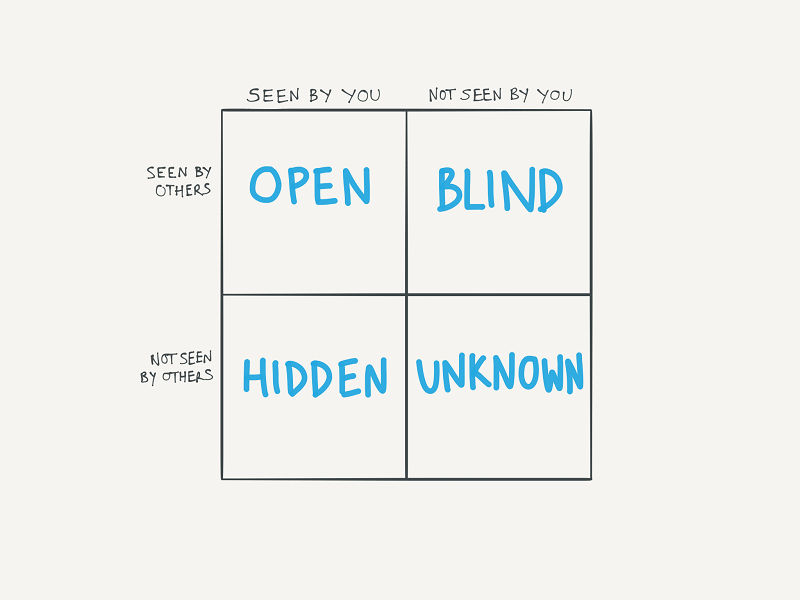The JOHARI Window (or Johari Rooms) is a model used to increase self-awareness and improve communication between couples or among groups of people.
Devised in the 1959’s by Joe Luft and Harry Ingham, Johari windows are a way of looking at how personality traits are expressed and concealed, using a model with 4 area quadrants.
In the ‘Open’ area is anything you know about yourself and are willing to share. Individuals can build trust between themselves by disclosing information to others and learning about others from information they in turn disclose. Note here that there can be cultural differences in what is acceptable to place in the ‘open’ arena; some things are perhaps better not communicated with others and people may pass on the information they receive further than you desire, or use it in a negative way.
The ‘Blind’ area contains any aspect of our personality which others see in us but which we are not aware. With the help of feedback from others you can become aware of some of your positive and negative traits, as perceived by others and overcome some of the personal issues that might be inhibiting personal or group dynamics within a team.
The ‘Hidden’ area contains aspects of yourself that you are aware of but might not want others to know. Some of this might be important to, but unknown by the other – and that could be a problem for the third party.
There are some aspects of our personality that are ‘Unknown’ to anyone, including ourselves; things that we don’t know we don’t know. Examples of ‘Unknown’ factors can be an under-estimated ability (through lack of opportunity, encouragement, confidence or training); an unknown illness; an unrealised natural ability or aptitude, fear or aversion; repressed or subconscious feelings or conditioned behaviour or attitudes from childhood.
The balance between the four quadrants can change, for example if you chose to tell someone an aspect of your life that you had previously kept hidden; the ‘Open’ area can be expanded by asking for feedback. Honest feedback can also reduce the ‘Blind’ quadrant.
We should be wary of assuming that everyone sees the same thing in the ‘Open’ quadrant. What we see will be coloured by our own views, biases and interests. James Holbrook, Clinical Professor of Law at the S.J. Quinney College of Law, gives the example of a photograph of children in a fenced-in room at a facility on the U.S. southern border. He sees undocumented aliens who crossed the border illegally, whereas I see vulnerable children suffering irreparable adverse childhood experiences. ‘We simply don’t see the same thing in that photograph.’
For mediators and arbitrators, the Johari quadrants illustrate four categories of our knowledge about the world and its’ limits in terms of what we and others can and cannot see in the different areas.
Holbrook believes that Johari windows implicate six counterintuitive character traits and related behaviours that are very useful to us in effective negotiation, mediation, facilitation, and conflict communication:
• Empathy – I must try to understand what you know from your perspective, including your perceptions, assumptions, and values that differ from mine.
• Humility – I must recognize the limits of what I know, including my limited perceptions, assumptions, biases, prejudices, and the possibility I am wrong about what I believe I know.
• Courage – Because you may know more than I know, I must ask you to tell me what you know, and it is scary for me to reveal to you the limitations in what I know.
• Trustworthiness – I must incentivize you to tell me what you know by treating you with civility, courtesy, and respect, and by carefully paying attention and listening to you.
• Curiosity – I must listen to what you say, understanding that you may “spin” what you disclose or you may choose not to tell me something specific.
• Open-mindedness – If you tell me something important that I did not know, I must be willing to be affected by your perspective, feelings, or interests.
Using Johari Window-theory, prevents mediators mistakenly assuming they already know everything they need to know. We must use empathy to understand things from another person’s perspective. By being trustworthy and disclosing things from our perspective it can incentivise others to in turn, reveal useful information into the ‘open’ arena. The more information – be it perspective, emotions or values, etc. – the more creative and comprehensive solutions can be examined. In other words, “it helps us to be more collaborative and effective” (Holbrook).
